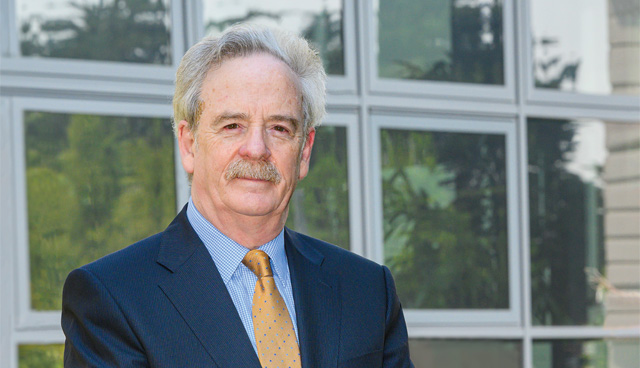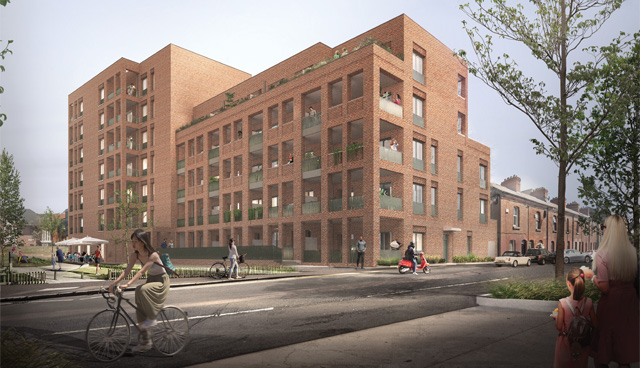
Programme for Government: Outlook for housing
22nd July 2020
Ministers of State: Peter Burke TD & Malcolm Noonan TD
22nd July 2020A holistic approach to housing

Against a backdrop of the ongoing housing crisis, the Covid-19 pandemic and a new government, Respond housing association and service provider is firmly committed to its dual strategy of ‘building homes, improving lives’. Ciarán Galway engages with CEO Declan Dunne to discuss priorities, passion and progress.
As one of Ireland’s largest Approved Housing Bodies (AHBs), Respond is unique in that it also provides a wide range of services alongside their housing work. These include Daycare for Older People Services, Early Childhood Care and Education Services, Homeless Services for Families, Family Support and Refugee Resettlement Services.
Launched in February 2019, Respond’s Strategic Plan for 2019 to 2023 commits to increasing its social housing stock by over 50 per cent, building 2,500 social housing units over the next five years, while simultaneously maintaining its existing housing stock and providing more homeless and support services where needed.
Priorities
As Ireland moves to ease many public health restrictions necessitated by the Covid-19 pandemic, a priority for Respond is progressing construction to complete various housing projects. In late April, construction resumed at 35 social housing projects deemed to be ‘essential’. Eight of these were Respond sites with work resuming on remaining sites on the 18 May with the lifting of restrictions. “We’re active on a total of 27 sites around the country and have over 1,640 homes in construction and onsite since May 2018. The priority is that these homes come on stream as quickly as possible for the many thousands of people who are depending on us to move into these homes,” Dunne indicates.
Simultaneously, the Respond CEO emphasises the importance of an affordable rental model for individuals whose income is above the social housing threshold but below the level required to secure a mortgage. “In the context of the ongoing housing crisis, that is a significant number of people. Consequently, Respond, along with our partners Tuath Housing, Dún Laoghaire-Rathdown County Council, the Housing Agency, the Housing Finance Agency and the Department of Housing, Local Government and Heritage is building Ireland’s first pilot cost rental housing scheme at Enniskerry Road, Stepaside in Dublin. This began in September 2019 and will provide 50 two-bedroom cost rental homes alongside 100 social homes. The rent for those will be €1,200 per month,” he outlines.
In many cases, when Respond commences a project to build social housing, the Approved Housing Body is also propositioned to provide a similar number of affordable rental units. However, there isn’t a model to facilitate this, Dunne recounts. “It is possible to double our output by building the same number of affordable rental homes as social homes, in the same timescale, with the same architect and on the same site. Essentially, the number of homes could be doubled if we had a national affordable rental model to do it. “However, it’s dreaming to suggest that this can be done with no money. That is not possible,” he says.
Rationale
At €1,200, the Enniskerry Road cost rental pilot is significantly less than the rent that might otherwise be charged by the private sector in the Dún Laoghaire–Rathdown area. “We hope that some of the people who move there might save the money they would otherwise be paying, build up a deposit and buy a home if they so wish. Affordability gives people options and choice. I remember a time when anyone with a moderate income could buy a house.
“While some politicians and commentators, including Sinn Féin’s Eoin Ó Broin TD, might contend that cost rental should be closer to €800 per month, currently it’s not possible,” Dunne states.
However, he does concur that a soft loan, similar to the Capital Advance Leasing Facility (CALF) for social housing, as suggested by Deputy Ó Broin, should be made available in a new affordable rental scheme.

We are driven by the needs of the people that we serve and the fact that Respond is a not-for-profit organisation just reinforces our pursuit of excellence and commitment to continuous improvement.
“If government makes that commitment, we can then borrow the remainder and we can start producing affordable homes based on the actual costs at more reasonable prices. People need homes to rent for as long as they want and at a price they can afford. Having a new national affordable rental model is one of Respond’s seven goals in our Strategic Plan 2019-2023 and is an absolute priority. We need to be undertaking hundreds of schemes, similar to the one at Stepaside, at the best rents possible,” he asserts.
The Respond CEO contends that having a new government-approved affordable rental model is an economic development imperative that goes far beyond housing. “It’s fundamentally unfair that a whole section of society is being excluded from access to affordable housing and it is poor planning by the State. We are going to lose the very people who are the engine of our public services and businesses as they emigrate to other countries where they can buy a home or access more affordable rents,” he stresses, adding: “Young people need an opportunity to buy a home. We all understand the Central Bank rules and context, but if the loan-to-income limit in London is four-and-a-half times your gross income, why is it only three-and-a-half in Ireland?”
Holistic
Central to Respond’s considerations when developing each social housing site is the experience of those who will live there. There are two components to this; the first is the quality of the homes and the second is quality of life.
“For Respond, the mission is not simply defined by building new houses. It has obligations to the 10,000 people already living in its homes. This is exemplified by the fact that our annual maintenance bill for our homes is €9 million. Likewise, over the last four years, we have spent €20 million on deep energy retrofitting across our older stock. Respond is holistic in its approach to housing provision, cognisant of design and proximity to services, as well as housing quality and maintenance,” its CEO indicates.
Crucially, unlike most other AHBs, Respond has a range of services to which they apply the principle of unintended consequences to ensure that these are evidence informed as well as helpful and empowering.
“From a landlord perspective, this is relatively straightforward, but from the perspective of childcare services or homeless services, it is important to deliver high quality services to people who want them. Our service users are guiding us, providing an evidence base for what we do,” Dunne explains.
In total, Respond employs 300 people, half of whom are care staff. For instance, it directly employs 80 people in 17 crèches around the country because “we understand the importance of early intervention for the social and emotional development of children”. In addition, the AHB has three day-care centres for older people with significant needs. These services are dually beneficial to those people requiring care as well as their carers at home.

People need secure homes to rent for as long as they want and at a price they can afford. Having a new national affordable rental model is one of Respond’s seven goals in our Strategic Plan 2019-2023 and is an absolute priority.
“Respond also has 70 staff working across six homeless services who provide 24/7 wraparound support to families there. The people in our services in the last three years have moved into their own homes within six months on average and benefited from its wrap around service model of care. We know from experience that the longer people remain in emergency accommodation the greater the impact on their overall health and wellbeing.
“It is critical, therefore, that there is a concerted focus on preventing homelessness in the first place and ensuring that when people do experience homelessness, they are quickly supported to access a home of their own, with ongoing support if they need it. We are very clear that all families and individuals want, need and deserve a secure home of their own and that all efforts must be redoubled to achieve this.
“Respond’s primary passion is impact and outcomes. I’m certainly not saying we’re perfect, there are many areas in which we could improve, but an independent annual survey of our tenants in 2019 revealed that 86 per cent are happy to have Respond as a landlord and are pleased with the services they receive. I’d like that figure to be much higher because our focus is not on what Respond thinks about itself, but on what our tenants and service users think,” Dunne insists.
Covid-19
As with any organisation, the Covid-19 pandemic posed challenges for Respond. One immediate impact was an overnight cessation in housing developments, Daycare for Older People Services, Early Childhood Care and Education Services. However, Respond’s Homeless Services remained operational throughout, working closely with the Dublin Region Homeless Executive (DRHE), Limerick City and County Council (LCCC) and the Health Service Executive (HSE) and did not record a single case of Covid-19.
“We received great support from the HSE, including from Dr Austin Carroll, HSE Clinical Lead for Homeless Services in Dublin. Meanwhile, the figure for houses that we have in the pipeline is €1 billion. With that comes much responsibility. The organisation was required to undertake a major risk assessment considering the pandemic, assessing six different scenarios and developed a plan for each. Even in the most severe scenario, we could manage it.
“Respond has the same calibre of board as a publicly quoted company and as such, it has a sophisticated approach to risk. It’s a continuous learning organisation with an emphasis on doing things professionally. We are driven by the needs of the people that we serve and the fact that Respond is a not-for-profit organisation reinforces our pursuit of excellence and commitment to continuous improvement,” Dunne states.
Progress
Almost four years into his role as CEO, Dunne’s tenure has resulted in significant change and growth in Respond. Restructuring of the organisation alongside the development of a new strategic plan injected fresh impetus and a renewed focus on delivery. Crucial to this was Respond’s development agreement.
To cut the cost of construction and therefore ensure delivery, Respond consulted its solicitors and developed its own fixed price agreement as an alternative to a public works contract. Currently, only three of Respond’s 27 contracts are public works contracts and even in the context of Covid-19, the AHB has no extra costs across 24 sites.
“The development agreement sets all the rules in our favour. Through that contract, those who want to provide houses for us must accept our terms. That has been revolutionary for Respond,” Dunne emphasises.
Having come from a compliance background, previously chairing the audit committees of two state bodies, Dunne also fostered a focus on compliance. “We have embraced regulation in this sector. The legislation has been passed, the regulator is being recruited as we speak, and we await the ministerial direction for implementation. Having come from highly regulated regimes, it seemed to me that there was a significant opportunity for this to occur. We have invested in that from the beginning, undertaking four programmes simultaneously: compliance; risk management; GDPR; and quality assurance,” he details.
I may be an administrator, but it’s very fulfilling to work with people coming from very different perspectives and backgrounds including some in very difficult scenarios, ranging from poor mental health and addiction to the trauma of homelessness.
Literally every aspect of the organisational structure has been touched by these changes. For instance, previously its management team was almost exclusively male, whereas now it has achieved gender parity. “We have encouraged greater female participation in the organisation, changing its tone for the better. Likewise, the diversity of backgrounds within Respond today has enriched the organisation. There is a great energy and enthusiasm.
“Whether people have been with Respond for 25 years or only joined this year, they all share a strong sense of purpose in striving to assist people in difficulty. This is the driver for all of us and is aligned with professionalism, efficiency and cost-effectiveness in what we do. People want to work in a place they can be proud of and we are very proud of the people we work alongside,” the CEO reflects.
Opportunities
Dunne advocates for social housing construction as a potential countercyclical economic stimulus amid the fiscal fallout of Covid-19. “In relation to the Programme for Government, we have argued that this is the time to invest in housing. Heading into a recession, many jurisdictions will prioritise investment in housing because of its high labour content, its significant revenue generation for the State and the provision of much needed homes. Likewise, when we lose our valued construction workers, it takes them years to come back,” he remarks.
Through the Housing Alliance, which Dunne also chairs, Respond lobbied for a plan and timeline to move AHBs back off the State balance sheet. “There is an opportunity in the Programme for Government’s commitment that the incoming government will ‘work on a package of reforms’ to enable Approved Housing Bodies to move off the State’s balance sheet.
“The risk with Approved Housing Bodies being on the government balance sheet means we will be competing with other government priorities including health, education, etcetera. This presents a significant threat to AHB social housing output where expectations are that the sector will deliver more than one-third of social housing targets.
“Until this point, money spent on housing through Approved Housing Bodies was not allocated from the Government’s capital budget because we’re borrowing and repaying it. We would like a return to that status and believe it’s in everyone’s interest.”
Ambitions
Looking ahead, Respond is eager to continue enhancing its partnership with local authorities and other statutory partners in order to deliver the social housing and community development required in their jurisdictions. “It’s an important relationship and there are many colleagues across those organisations that we hold in high regard,” Dunne responds.
In terms of developing his organisation’s repertoire of services, the CEO reveals a willingness to explore the future as the Government commits to the ending of Direct Provision. “We have many qualified social care graduates and care workers on our staff, so we are not frightened by this kind of task. It’s a challenge but that’s what we enjoy and we are happy to explore new areas of work where there is a need identified. I’m not saying that Respond is a panacea, but when a large housing provider gets involved in homeless services, we are not dependent on others to provide the housing component of the service,” he says.
“I may be an administrator, but it’s very fulfilling to work with people coming from very different perspectives and backgrounds including some in very difficult scenarios, ranging from poor mental health and addiction to the trauma of homelessness. When a person subsequently approaches me and my colleagues to tell us that they are moving on to a home, it creates an excitement for both them and us.
“Overall, it’s not just about the houses, which are a great achievement in themselves, rather it’s about people’s lives. The houses are built because people need them, they’re not an endpoint. Supporting the community development aspect is very important,” Dunne concludes.
Profile: Declan Dunne
Declan joined Respond as Chief Executive Officer in August 2016. Respond, established 38 years ago, is an Approved Housing Body (AHB) with approximately 10,000 tenants and a service provider with a range of services including Daycare for Older People, Early Childhood Care and Education, Homeless Services for Families, Family Support and Refugee Resettlement Services. Declan is currently the chair of the Housing Alliance which is a collaboration of six of Ireland’s largest AHBs.
Declan is an experienced General Manager who built a business over many years and sold to an American multi-national and went on to work as their General Manager for Ireland.
In his previous role, Declan was Chief Executive Officer with Sophia Housing Association. He was also a non-executive director of the Ballymun Regeneration Board for 10 years and chair of the audit committee which oversaw the Ballymun Regeneration Masterplan.



